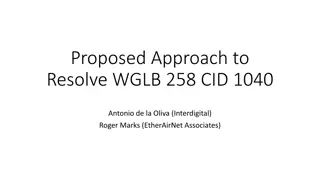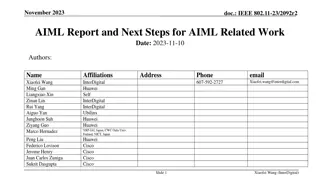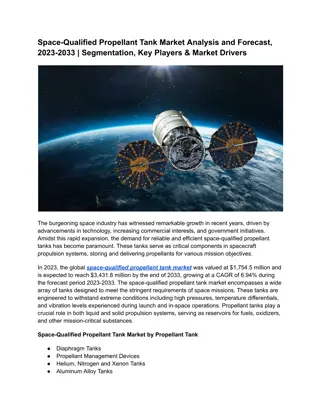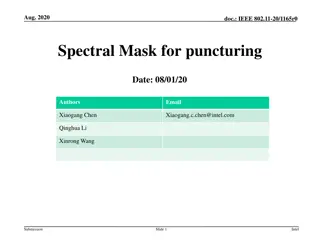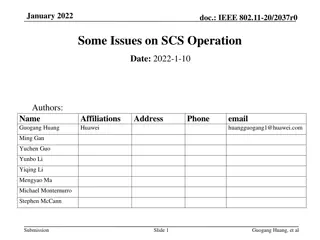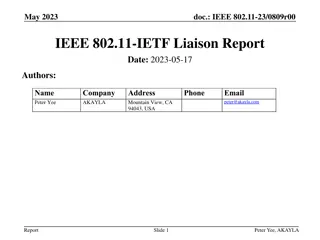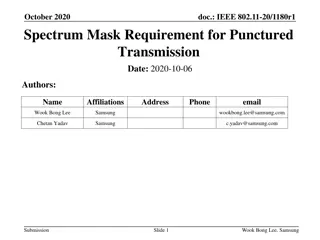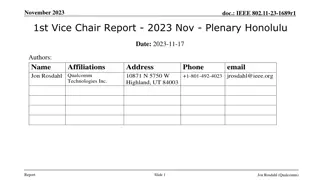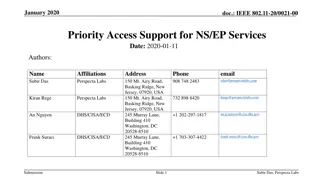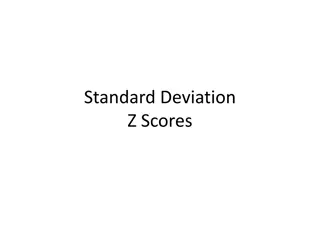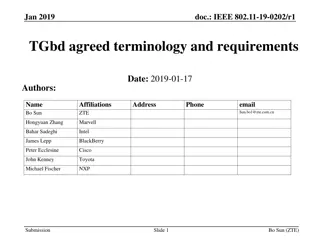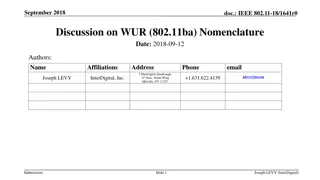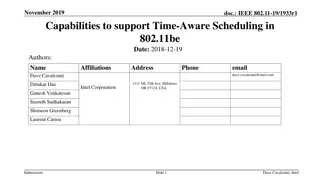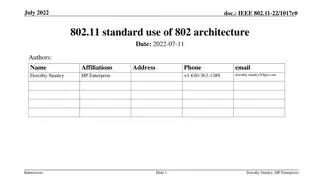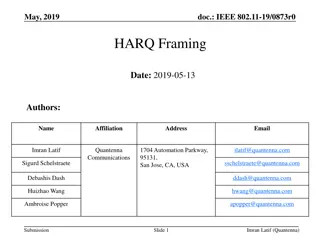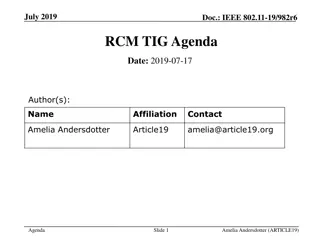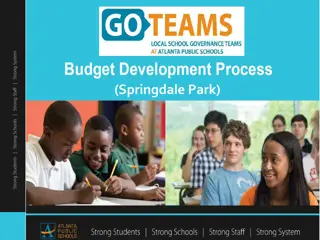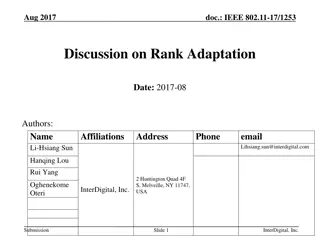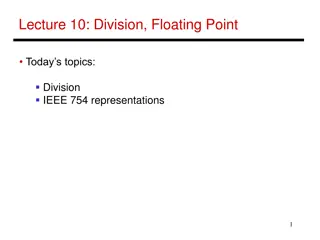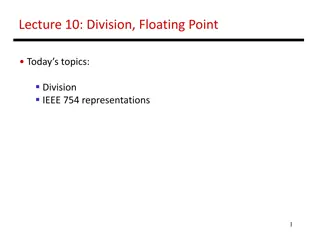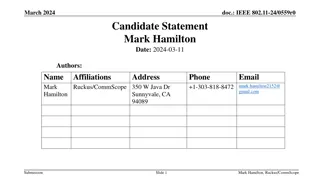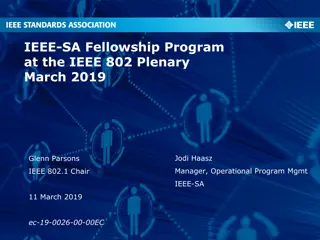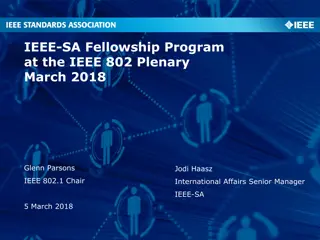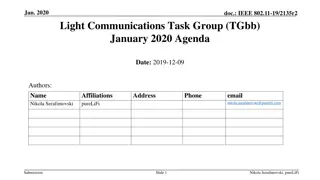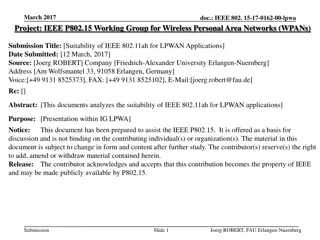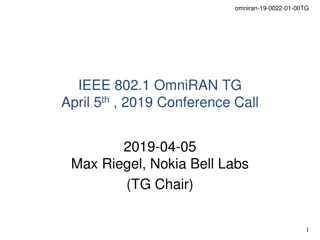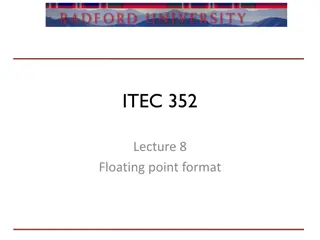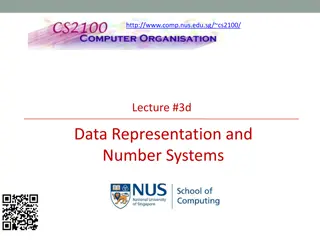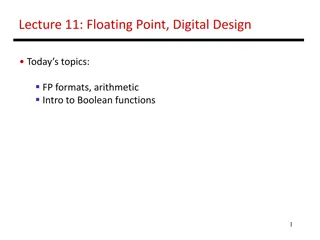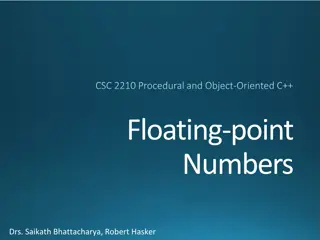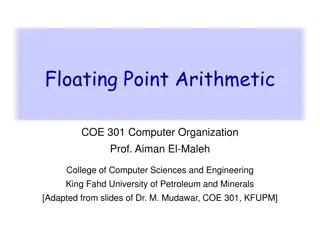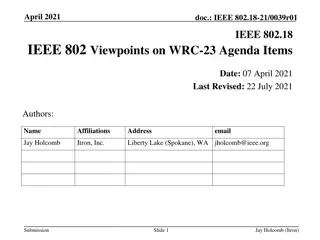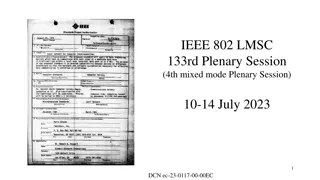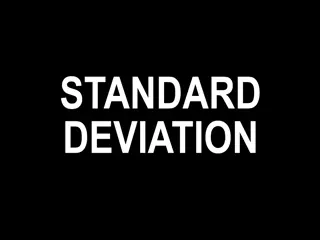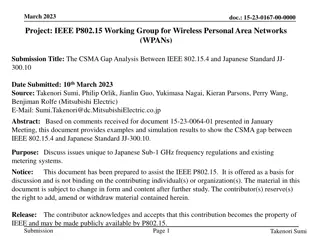Proposed Approach for MAC Address Assignment in IEEE 802.11
IEEE 802.1CQ is working on a mechanism to assign local MAC address blocks to end nodes specifically related to IEEE 802.11 standards. The current draft lacks a pre-association mechanism for IEEE 802.11 stations to obtain a local MAC address before association. The proposed remedy suggests specifying
6 views • 7 slides
IEEE 802.11-23/2092r2 AIML Report Summary
This document conveys the findings of the AIML Technical Report for IEEE 802.11 networks. It covers AIML use cases in WLANs, performance enhancement opportunities, IEEE 802.11 feature requirements, standard impacts, and proposed next steps for AIML integration. AIML's significance in various technol
3 views • 17 slides
IEEE 802.11-24/0277r0 March 2024 Session WG Chair's Supplementary Material
This report by Dorothy Stanley of HP Enterprise provides supplementary material for the March 2024 IEEE 802.11 WG session, covering participant behavior in IEEE-SA activities, adherence to IEEE Codes of Ethics & Conduct, and requirements for individuals in the IEEE-SA standards development process.
1 views • 34 slides
Space-qualified Propellant Tank Market Analysis and Forecast
In 2023, the global space-qualified propellant tank market was valued at $1,754.5 million and is expected to reach $3,431.8 million by the end of 2033, growing at a CAGR of 6.94% during the forecast period 2023-2033.\nRead Report Overview: \/\/bisresearch.com\/industry-report\/space-qualified-propel
6 views • 3 slides
Proposal for Reusing ETSI Puncturing Mask in IEEE 802.11be Standard
A proposal is presented in the document IEEE 802.11-20/1165r0 discussing the possibility of reusing the ETSI-defined puncturing mask in the context of the 11be standard. The document highlights the comprehensive nature of the ETSI mask, covering various puncturing cases, and suggests that adopting t
0 views • 12 slides
Issues with SCS Operation in IEEE 802.11be Standard
The document discusses technical issues related to the SCS (Spatial Channel Sharing) operation in the IEEE 802.11be standard. It highlights inconsistencies in the standard regarding parameterized QoS requirements, mixing of traffic streams with different QoS needs, and challenges in prioritizing SCS
0 views • 15 slides
May 2023 IEEE 802.11-IETF Liaison Report by Peter Yee
This document presents the IEEE 802.11-IETF liaison report for May 2023 by Peter Yee from AKAYLA. It includes details on upcoming IETF meetings, joint activities between IETF and IEEE, topics of coordination, and information on relevant protocols and BOFs to be discussed. Additionally, it outlines t
1 views • 18 slides
Spectrum Mask Requirements in IEEE 802.11 for Punctured Transmission
The document discusses the spectrum mask requirements for punctured transmission in IEEE 802.11 standards, specifically focusing on differences between ETSI and IEEE 802.11ax spectral masks. It covers cases of puncturing scenarios and additional channel edge masks to be applied in different situatio
1 views • 16 slides
IEEE 802.11-23-1689r1 Vice Chair Report - November 2023 Plenary Session
The document presents the Vice Chair report by Jon Rosdahl from Qualcomm at the IEEE 802.11-23-1689r1 meeting in Honolulu on November 17, 2023. It covers agenda items, session information, meeting logistics, successful meeting protocols, and important event summaries. Additionally, it provides detai
1 views • 25 slides
IEEE 802.11-20/0021-00 Priority Access Support for NS/EP Services Overview
This document discusses the importance of priority access support in IEEE 802.11be for National Security and Emergency Preparedness (NS/EP) services. It outlines the need for standardized mechanisms to ensure priority services in WLAN networks during NS/EP events when cellular coverage is unavailabl
1 views • 15 slides
Understanding Standard Deviation, Variance, and Z-Scores
Explore the importance of variation in interpreting data distributions, learn how to calculate standard deviation, understand z-scores, and become familiar with Greek letters for mean and standard deviation. Discover the significance of standard deviation in statistical analysis and the difference b
1 views • 18 slides
IEEE 802.11-19-0202/r1 TGbd Agreed Terminology and Requirements
This document outlines the agreed terminology and requirements for the development of the next generation of IEEE 802.11p technology within IEEE 802.11bd Task Group. It covers aspects such as interoperability, co-existence, backward compatibility, and fairness between IEEE 802.11p and IEEE 802.11bd
0 views • 6 slides
Workplace Exposure Standard for Silica Dust in Stone Benchtop Fabrication
Reduction in workplace exposure standard for respirable crystalline silica dust has been implemented, halving the national standard to 0.05 mg/m3. The new standard aims to protect workers in stone benchtop fabrication businesses from serious lung diseases caused by breathing in silica dust. Employer
1 views • 8 slides
Discussion on Proposed Nomenclature for IEEE 802.11ba Standard
This document presents a discussion on the proposed nomenclature for the IEEE 802.11ba standard draft amendment, highlighting the need for clarity and consistency in terminology to avoid confusion and specification issues. Various new terms and definitions are suggested for different types of device
0 views • 13 slides
Time-Aware Scheduling Capabilities in IEEE 802.11be
Describing necessary enhancements to enable Time-Aware Scheduling in IEEE 802.11be for time-sensitive applications. The focus is on aligning with the 802.1Qbv standard to address latency, jitter, and reliability issues, presenting a structured outline of requirements and configurations essential for
0 views • 24 slides
IEEE Std. 802.11-22/1017r0 Overview and Architecture Presentation
This presentation by Dorothy Stanley from HP Enterprise delves into the utilization of IEEE Std. 802.11-2020 standards focusing on the IEEE Std. 802 overview and architecture. It covers topics such as the use of LLC, MAC address formats, QoS mechanisms, MSDU formats, and various MAC services and pro
0 views • 10 slides
Enhancing HARQ Framing for IEEE 802.11 Standards
Hybrid-ARQ (HARQ) is a candidate topic for TGbe presentations in IEEE 802.11 standards. Despite previous unsuccessful attempts, there is renewed interest in enabling HARQ through framing support. This document discusses the importance of presenting HARQ framing, outlining the necessary information a
1 views • 7 slides
IEEE 802.11-19/982r6 RCM TIG Meeting Summary
The July 2019 IEEE 802.11-19/982r6 RCM TIG meeting in Vienna, Austria was chaired by Amelia Andersdotter and Vice-Chaired by Mark Hamilton. The agenda covered topics such as volunteer roles, participation guidelines, meeting etiquette, and resources including links to IEEE policies. Participants wer
1 views • 22 slides
GO Team Budget Development Process for School FY22
This meeting focuses on the GO Team's budget development process in alignment with the school's strategic plan for fiscal year 2022. It outlines the roles of the principal and the team members, emphasizing the importance of strategic prioritization and resource allocation to support student achievem
0 views • 22 slides
Discussion on Rank Adaptation for SU-MIMO Transmission in IEEE 802.11-17/1253
MIMO transmission in IEEE 802.11ay supports up to 8 data streams with a focus on SU-MIMO. The need for efficient rank adaptation procedures and corresponding signaling mechanisms is highlighted. The document addresses rank adaptation procedures, example implementations, challenges faced, and propose
0 views • 6 slides
Understanding Division and Floating Point Arithmetic
Explore the concepts of division and IEEE 754 representations in floating point arithmetic. Learn about the processes involved in division, including steps to find quotient and remainder. Delve into an example of dividing numbers along with hardware implementation for efficient division.
0 views • 19 slides
Understanding Division in IEEE 754 Floating Point Representations
Today's lecture delves into division in IEEE 754 representations, illustrating the step-by-step process with examples. The division hardware process, efficient division methods, and handling divisions involving negatives are also covered, emphasizing strategies for simplification and efficiency in a
0 views • 18 slides
Mark Hamilton's Candidacy Statement for IEEE 802.11 Vice-Chair
Mark Hamilton, a candidate for the IEEE 802.11 Vice-Chair position, has a strong background in IEEE standards development and active participation in various IEEE groups, showcasing leadership and commitment to the working group's goals. His experience and dedication make him a valuable candidate fo
0 views • 5 slides
Vincenzo Piuri: Vision for IEEE Presidency and Technical Leadership
Vincenzo Piuri, a seasoned IEEE volunteer with 33 years of experience, is a candidate for the position of IEEE President-Elect. His strategic actions aim to drive innovation, enhance member value, and focus on young professionals. With a background in academic and industrial research, Piuri's propos
0 views • 8 slides
IEEE-SA Fellowship Program at IEEE 802 Plenary March 2019 Schedule
The IEEE-SA Fellowship Program at the IEEE 802 Plenary in March 2019 featured key participants like Jodi Haasz, Glenn Parsons, and other industry experts from various countries. The program included sessions on IEEE standards development processes, newcomer orientation, working group meetings, techn
0 views • 9 slides
IEEE-SA Fellowship Program at IEEE 802 Plenary March 2018
The IEEE-SA Fellowship Program at the IEEE 802 Plenary in March 2018 featured notable participants like Glenn Parsons, Jodi Haasz, Richard Anago, Lloyd Matabishi, Rudo Mudavanhu, and Yvonne Umutoni, among others. The program included a schedule covering various sessions such as an introduction to IE
0 views • 9 slides
IEEE 802.11 TGbb January 2020 Meeting Agenda
The document outlines the agenda for the IEEE 802.11 TGbb meeting scheduled for January 2020. It covers administrative items, task group operating rules, guidelines for IEEE WG meetings, and the participants' duty to inform the IEEE about essential patent claims.
0 views • 21 slides
IEEE's Worldwide Conference Organizing Activities Presented at Monaco 2016 Meeting
Professor Amara, IEEE CASS Vice-President for Conferences, discussed IEEE's global conference organization at the 2016 UIA Associations Meeting in Monaco. With over 410,000 members in 160 countries, IEEE focuses on technological innovation for humanity. The association publishes a significant portio
0 views • 23 slides
Suitability of IEEE 802.11ah for LPWAN Applications Analysis
This document analyzes the suitability of IEEE 802.11ah for Low Power Wide Area Network (LPWAN) applications. It examines the features of IEEE 802.11ah, such as OFDM-based FEC and its performance in fulfilling LP-WAN use-cases. The document also discusses channel models, interference resistance, and
0 views • 22 slides
IEEE 802.1 OmniRAN TG Conference Call Summary
The IEEE 802.1 OmniRAN TG Conference Call on April 5th, 2019, chaired by Max Riegel from Nokia Bell Labs, covered agenda proposals, reviews of minutes, reports, conclusions, contributions, upcoming meetings, and essential patent claim disclosures. Participants were reminded of their duty to inform I
0 views • 13 slides
Understanding Floating Point Numbers in Computer Science
Exploring the concepts of floating point format, normalization, conversion processes, and IEEE 754 standard for representing floating point numbers in computer systems. Learn about two's complement, excessive notation, and the components that make up a floating point number. Dive into examples of co
0 views • 18 slides
Understanding Data Representation and Number Systems in Computing
Exploring the representation of real numbers in computers, this content delves into fixed-point and floating-point representations, including IEEE 754 standards for floating-point numbers. Learn about the structure of these representations and how they enable the processing of both integers and real
0 views • 10 slides
Understanding Floating Point Formats and Arithmetic in Digital Design
Today's lecture covers the concepts of floating-point formats and arithmetic in digital design, focusing on special cases, normalized and denormalized numbers, as well as IEEE 754 format representation. Through examples and explanations, learn how to convert decimal numbers to single-precision binar
0 views • 19 slides
Understanding Floating-Point Numbers in C++: IEEE Standard 754
Floating-point numbers are approximate representations of real numbers used in programming. IEEE Standard 754 defines how floating-point data is stored, including single and double precision formats. Learn about the sign, mantissa, exponent, biases, precision, overflow, and underflow in floating-poi
0 views • 25 slides
Understanding Floating-Point Arithmetic in Computer Organization
Exploring floating-point numbers and their representation in the IEEE 754 standard, including addition, subtraction, multiplication, and rounding. Learn about the significance of extra bits, the importance of normalization, and the impact of precision on floating-point values. Delve into MIPS floati
0 views • 74 slides
IEEE 802 Viewpoints on WRC-23 Agenda Items
This document presents IEEE 802's viewpoints on Agenda Items related to current IEEE 802 standards activities for the WRC-23. It reflects the perspectives of IEEE 802 and provides insights on various AI topics such as frequency bands and IMT multiple bands. The document offers analysis and considera
0 views • 9 slides
Overview of IEEE Indemnification and Protection of Volunteers
In this overview, the IEEE Legal and Compliance Department discusses the indemnification of volunteers, outlining conditions under which indemnification is provided to protect volunteers from liabilities. Indemnification is crucial for ensuring volunteers are safeguarded when acting in the best inte
0 views • 9 slides
Ethical Guidelines in IEEE-SA Activities
Participants in IEEE-SA activities are expected to adhere to the core principles of the IEEE Codes of Ethics and Conduct, including upholding integrity, treating others fairly, and acting independently. The standards development process aims to ensure fair and equitable consideration of all viewpoin
0 views • 26 slides
Understanding Standard Deviation and Standard Error of the Means
Standard deviation measures the variability or spread of measurements in a data set, while standard error of the means quantifies the precision of the mean of a set of means from replicated experiments. Variability is indicated by the range of data values, with low standard deviation corresponding t
0 views • 7 slides
CSMA Gap Analysis Between IEEE 802.15.4 and Japanese Standard JJ-300.10
This document analyzes the differences in CSMA protocol and performance between IEEE 802.15.4 and Japanese Standard JJ-300.10, focusing on unique issues related to Japanese Sub-1 GHz frequency regulations and metering systems. With increasing data traffic and channel access demands, insights are pro
0 views • 19 slides
